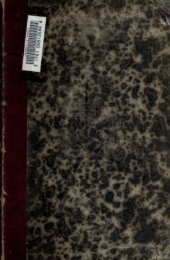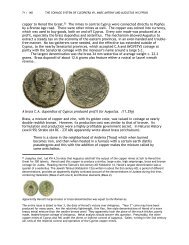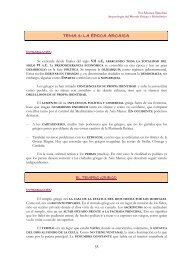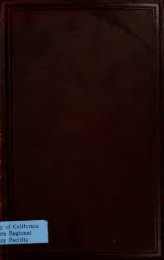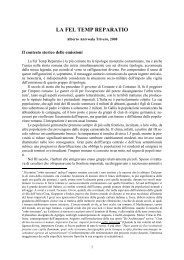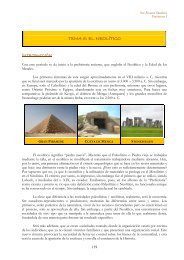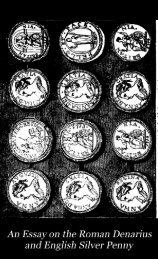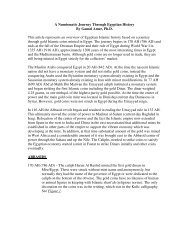Numismata hellenica: a catalogue of Greek coins; with notes, a map ...
Numismata hellenica: a catalogue of Greek coins; with notes, a map ...
Numismata hellenica: a catalogue of Greek coins; with notes, a map ...
You also want an ePaper? Increase the reach of your titles
YUMPU automatically turns print PDFs into web optimized ePapers that Google loves.
34]<br />
ruler <strong>of</strong> Argissa, Gyrtone, Orthe, Elone, and Oloosson,<br />
Eu. 162.<br />
Polyrhenium (Cretse), its remains two or three miles inland<br />
from Kisamo-Kasteli, Ins. 31.<br />
Poinpeiopolis. See Soli Cilicise.<br />
Pompeius Magnus, Syria made a Roman province by him<br />
in 65 B.C.; peace made between him and Antiocbus I.<br />
<strong>of</strong> Commagene, K. 38 : the son <strong>of</strong> Pylaemenes <strong>of</strong> Paphla-<br />
gonia restored by him, K. 43 : Aristarchus made king<br />
<strong>of</strong> Colchis by him, K. 51.<br />
Pontic aera commenced in 297 b.c, K. 42. 47<br />
adopted by Nicomedes II. <strong>of</strong> Bithynia, K. 42.<br />
INDEX TO THE NOTES.<br />
: and<br />
Pontus, cause <strong>of</strong> the names <strong>of</strong> its kings being mostly Persian,<br />
<strong>with</strong> <strong>Greek</strong> terminations, K. 47 : reduced to a Roman<br />
province in a.d. 62, K. 48.<br />
Populonium (Tyrrhenise), in Etruscan Pupluna, colonized<br />
by some <strong>of</strong> the Phocaeans who abandoned Alalia in<br />
Corsica; its remains near the Porto Barretto, Eu. 136.<br />
Poroselene or Pordosilene, now Pyrgo, one <strong>of</strong> the cluster<br />
<strong>of</strong> islands called Hecatonnesi on the ^Eolic coast,<br />
Ins. 32.<br />
Posidonia<br />
Troezen.<br />
the original name <strong>of</strong> Troezen, Eu. 109. See<br />
(Italise), afterwards Paestus or Paestum, its importance<br />
proved by its great temples and abundant<br />
<strong>coins</strong> ; an <strong>of</strong>fset from Sybaris ; a Roman colony about<br />
300 B.C., Eu. 136.<br />
Potentia still so called ; the <strong>coins</strong> <strong>of</strong> the Lucani perhaps<br />
struck there, Eu. 127.<br />
Potidaea (Macedoniae), on the isthmus <strong>of</strong> Pallene, called<br />
Cassandreia after its renovation by Cassander, Eu. 94.<br />
Praesus (Cretae), now Presiis, in the eastern peninsula <strong>of</strong><br />
Crete ; important error <strong>of</strong> Upaiawt for nptdvaiot in p.<br />
478 <strong>of</strong> the text <strong>of</strong> Strabo, Ins. 32.<br />
Prenassus or Prinassus (Cariae) situated apparently on the<br />
coast <strong>of</strong> Caria, between Miletus and lassus. As. 101 :<br />
Egyptian types on its <strong>coins</strong>. As. 102.<br />
Priansus (Cretae), its situation ; unnoticed apparently by<br />
Strabo, in consequence <strong>of</strong> an error in his text <strong>of</strong> IIpaiiTioi<br />
for Upidvaiot, Ins. 32.<br />
Priapus (Mysiae), its remains at Karaboa, at the entrance<br />
<strong>of</strong> the Propontis; Apollo, Ceres, Diana, and Bacchus<br />
there worshipped. As. 102. 151.<br />
Priene (loniae), now Samsun-Kalesi, ruins still extant <strong>of</strong><br />
its temple <strong>of</strong> Minerva Polias, which was burnt by Xerxes<br />
and restored by Alexander the Great; colonized from<br />
Athens, and subsequently from Thebes, As. 102.<br />
Proconnesus, now Marmara, an island in the Propontis<br />
famous for its marble, Ins. 33.<br />
Procris, the dog and spear presented by her to her husband<br />
Cephalus represented on the <strong>coins</strong> <strong>of</strong> Same Cephalleniae,<br />
Ins. 37.<br />
Proni (Cephalleniae) now Korontis, Ins. 33.<br />
Prostanna (Pisidiae) known only from Ptolemy and its<br />
<strong>coins</strong>. As. 152.<br />
Prusa irpoc Sdkaaaij, Cius Bithyniae thus named by<br />
Prusias I., As. 102.<br />
Prusa Trpoc 'OXvyiTctf (Bithyniae), the names <strong>of</strong> the kings<br />
Prusias I. and II. thence derived. As. 102.<br />
irpoc 'Xirlif, a city founded by Prusias I. or II. on<br />
the river Hypius, As. 102.<br />
Prusias, difficulty <strong>of</strong> distinguishing between many <strong>of</strong> the<br />
<strong>coins</strong> <strong>of</strong> the two kings <strong>of</strong> Bithynia <strong>of</strong> this name, K. 41.<br />
^— 1.<br />
<strong>of</strong> Bithynia, rarity <strong>of</strong> his silver <strong>coins</strong>, K. 41 :<br />
his name derived from the city Prusa on Olympus,<br />
As. 102.<br />
II. <strong>of</strong> Bithynia, probable reference <strong>of</strong> the wing on<br />
some <strong>of</strong> his <strong>coins</strong> to his descent from Perseus ; similar<br />
device adopted by Philip V. <strong>of</strong> Macedonia, K. 41.<br />
Prymnessus (Phrygiae) in the valley <strong>of</strong> the Thymbres j this<br />
river personified on its <strong>coins</strong>; king Midas its reputed<br />
founder. As. 103.<br />
Psaumis, a citizen <strong>of</strong> Camarina, honoured in one <strong>of</strong> the<br />
odes <strong>of</strong> Pindar, Ins. 52.<br />
Pteleum, a town <strong>of</strong> the Thracian Chersonese, Eu. 32.<br />
Pteras. See Aptara Cretae.<br />
Ptolemaeus I. sumamed Soter by the Rhodians for having<br />
saved them from Demetrius Poliorcetes; Salamis taken<br />
by him in 295 b.c. ; resigns his authority to his son in<br />
285 B.C., K. 58 : most <strong>of</strong> his <strong>coins</strong> struck in Phoenicia,<br />
but some in Cyprus after the capture <strong>of</strong> Salamis ; deified<br />
after his death, K. 59.<br />
Cyprus ,<br />
II. (Philadelphus), his <strong>coins</strong> mostly struck in<br />
K. 59.<br />
III. (Euergetes), the trident on his <strong>coins</strong> probably<br />
allusive to his naval successes in Asia Minor and<br />
Thrace, and to his victory over Antigonus Gnnatas at<br />
Andrus, K. 60.<br />
IV. (Philopator), description <strong>of</strong> one <strong>of</strong> his <strong>coins</strong>,<br />
K. 61.<br />
V. (Epiphanes), son <strong>of</strong> Ptolemy IV,, 205 b.c.<br />
the first year <strong>of</strong> his reign, K. 61.<br />
VI. (Philometor) supports Alexander I. <strong>of</strong> Syria,<br />
K. 27. 33 ; gives him his daughter Cleopatra in mar-<br />
riage ; attempt <strong>of</strong> Alexander I. to assassinate him ; defeats<br />
the latter, but dies from an accident at the same<br />
time, K. 33 : his <strong>coins</strong>, K. 61.<br />
VII. (Euergetes or Physcon), Alexander Zabinas<br />
<strong>of</strong> Syria set up by him ; afterwards supports Antiocbus<br />
VIII., and gives him his daughter Tryphaena in<br />
marriage, K. 33.<br />
VIII. (Lathyrus), his joint reign <strong>with</strong> his mother<br />
Cleopatra, K. 61.<br />
IX. (Alexandrus), reason for attributing some<br />
<strong>coins</strong> to him, K. 62.<br />
X. sent from Rome by Sylla to marry Berenice,<br />
daughter <strong>of</strong> Ptolemaeus VIII.; murders Berenice; is<br />
put to death by the Alexandrians ; legitimate Ptole-<br />
maean family thus extinguished, K. 62.<br />
XI. (Auletes), illegitimate son <strong>of</strong> Ptolemaeus<br />
VIII.. K. 62.<br />
XII. (Dionysus) son <strong>of</strong> Ptolemaeus XL, his joint<br />
reign <strong>with</strong> his sister Cleopatra the Great, K. 02.<br />
XIII., brother <strong>of</strong> Ptolemaeus XII., his joint reiga<br />
<strong>with</strong> his sister Cleopatra the Great, K. 62.<br />
Ceraunus, son <strong>of</strong> Ptolemaeus I., assassinates<br />
Seleueus I 280 b.c , and is slain by the Gauls in the<br />
same year, K. 12.<br />
Ptolemaic dynasty, difficulty <strong>of</strong> arranging its <strong>coins</strong>, particularly<br />
in distinguishing those <strong>of</strong> the first and second<br />
Ptolemies ; most <strong>of</strong> the uncertain <strong>coins</strong> to be ascribed to<br />
these two kings, K. 59 : explanation <strong>of</strong> some <strong>of</strong> the types<br />
<strong>of</strong> this dynasty, K, 63.<br />
Ptolemais(Phoeniciae), previously Ace or Akka, and now<br />
called by the latter name ; named Ptolemais from Pto-<br />
lemy Philadelphus ; retaken by the Seleucidae, and a colony<br />
<strong>of</strong> 'Avriox»c placed in it by Antiocbus IV., As.<br />
103.<br />
, the harbour <strong>of</strong> Barce Cyrenaicae so called, Af. 1.<br />
WtoXioikoq, a word found only on <strong>coins</strong> <strong>of</strong> Aptara Cretae,<br />
meaning founder <strong>of</strong> the city, and apphed to Apteras <strong>of</strong><br />
Delphi, Ins. 3.<br />
Punic letters on <strong>coins</strong> <strong>of</strong> the Sicilian cities, Acragas, Ins. 49 :<br />
Motya, Ins. 65 : Panormus, Ins. 66 : and SoMs,<br />
Ins. 70.<br />
Pylaemenes, king <strong>of</strong> Papblagonia, placed on the throne by<br />
his father Nicomedes II. <strong>of</strong> Bithynia; his speedy ejection<br />
by Mithradates the Great ; resemblance <strong>of</strong> a coin <strong>of</strong> his<br />
I



